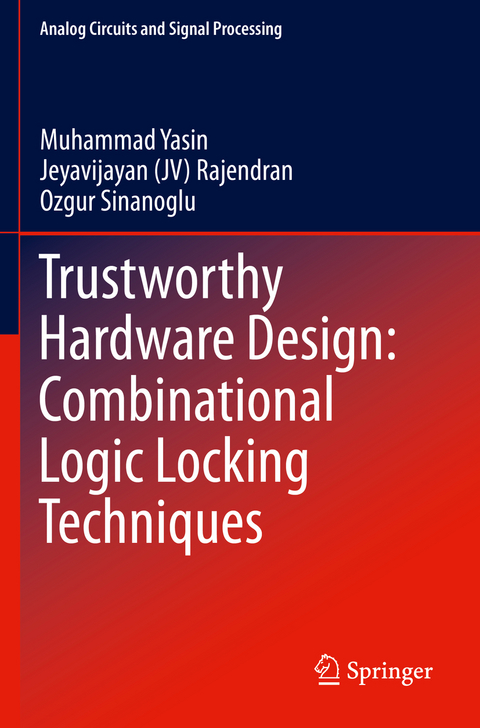
Trustworthy Hardware Design: Combinational Logic Locking Techniques
Springer International Publishing (Verlag)
978-3-030-15336-6 (ISBN)
Different from the edited monograms, the chapters in this book are not re-compilations of research papers. The book follows a pedagogical approach. Each chapter has been planned to emphasize the fundamental principles behind the logic locking algorithms and relate concepts to each other using a systematization of knowledge approach. Furthermore, the authors of this book have contributed to this field significantly through numerous fundamental papers.
lt;p>Muhammad is a PhD candidate at Tandon School of Engineering and a Global PhD Student Fellow in NYUAD. He obtained his MS in Microsystems Engineering from Masdar Institute of Science and Technology, UAE, in 2013 and BS in Elec- trical Engineering from University of Engineering and Technology (UET) Lahore, Pakistan, in 2007. He has previously served as Lecturer at COMSATS Institute of IT, Lahore. His research interests include Hardware Security and Design for Trust.
Jeyavijayan Rajendran is an Assistant Professor in the Department of Elec- trical and Computer Engineering at Texas A&M University. He obtained his Ph.D. degree in the Electrical and Computer Engineering Department at New York University in August 2015. His research interests include hardware secu- rity and emerging technologies. His research has won the NSF CAREER Award in 2017, the ACM SIGDA Outstanding Ph.D. Dissertation Award in 2017, and the Alexander Hessel Award for the Best Ph.D. Dissertation in the Electrical and Computer Engineering Department at NYU in 2016. He has won three Student Paper Awards (ACM CCS 2013, IEEE DFTS 2013, and IEEE VLSI Design 2012); four ACM Student Research Competition Awards (DAC 2012, ICCAD 2013, DAC 2014, and the Grand Finals 2013); Service Recognition Award from Intel; Third place at Kaspersky American Cup, 2011; and Myron M. Rosenthal Award for Best Academic Performance in M.S. from NYU, 2011. He organizes the annual Embed- ded Security Challenge, a red-team/blue-team hardware security competition and has co-founded Hack@DAC, a student security competition co-located with DAC. He is a member of IEEE and ACM. Ozgur Sinanoglu is an Associate Professor of electrical and computer engineer- ing at New York University Abu Dhabi. He earned his B.S. degrees, one in Elec- trical and Electronics Engineering and one in Computer Engineering, both from Bogazici University, Turkey in 1999. He obtained his MS and PhD in Computer Science and Engineering from University of California San Diego in 2001 and 2004, respectively. He has industry experience at TI, IBM and Qualcomm, and has been with NYU Abu Dhabi since 2010. During his PhD, he won the IBM PhD fellow- ship award twice. He is also the recipient of the best paper awards at IEEE VLSI Test Symposium 2011 and ACM Conference on Computer and Communication Security 2013. Prof. Sinanoglu's research interests include design-for-test, design-for-security and design-for-trust for VLSI circuits, where he has around 170 conference and journal papers, and 20 issued and pending US Patents. Sinanoglu has given more than a dozen tutorials on hardware security and trust in leading CAD and test conferences, such as DAC, DATE, ITC, VTS, ETS, ICCD, ISQED, etc. He is serving as track/topic chair or technical program committee member in about 15 conferences, and as (guest) associate editor for IEEE TIFS, IEEE TCAD, ACM JETC, IEEE TETC, Elsevier MEJ, JETTA, and IET CDT journals.Prof. Sinanoglu is the director of the Design-for-Excellence Lab at NYU Abu Dhabi. His recent research in hardware security and trust, including logic locking, is being funded by US National Science Foundation, US Department of Defense (Army Research Office and DARPA), Semiconductor Research Corporation, and Mubadala Technology.The Need for Logic Locking.- A Brief History of Logic Locking.- Pre-SAT Logic Locking.- The SAT Attack.- Post-SAT 1: Point function-based Logic Locking.- Approximate Attacks.- Structural Attacks.- Post-SAT 2: Insertion of SAT-unresolvable Structures.- Post-SAT 3: Stripped-Functionality Logic Locking.
| Erscheinungsdatum | 22.09.2020 |
|---|---|
| Reihe/Serie | Analog Circuits and Signal Processing |
| Zusatzinfo | XXI, 142 p. 65 illus., 58 illus. in color. |
| Verlagsort | Cham |
| Sprache | englisch |
| Maße | 155 x 235 mm |
| Gewicht | 261 g |
| Themenwelt | Informatik ► Theorie / Studium ► Algorithmen |
| Informatik ► Weitere Themen ► Hardware | |
| Technik ► Elektrotechnik / Energietechnik | |
| Schlagworte | combinational logic locking • Hardware Design • hardware security • logic locking concepts • qualitative security evaluation • security techniques |
| ISBN-10 | 3-030-15336-3 / 3030153363 |
| ISBN-13 | 978-3-030-15336-6 / 9783030153366 |
| Zustand | Neuware |
| Informationen gemäß Produktsicherheitsverordnung (GPSR) | |
| Haben Sie eine Frage zum Produkt? |
aus dem Bereich


